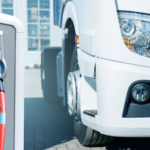An introduction to electric road freight vehicles
Road freight transportation enables economic and social development but is also a major contributor to greenhouse gas (GHG) emissions due to its heavy consumption of fossil fuels.
Globally, the truck sector currently contributes to 39% of the transport sector’s GHG emissions, and a total of 5% of all fossil fuel derived carbon dioxide emissions. While currently freight transport accounts for less than half of transport emissions, it is expected to grow by 56%−70% between 2015 and 2050, despite large improvements in energy efficiency. This is due to the demand for freight transport expecting to increase from the rise in online shopping, increased urbanisation and reduced car ownership.
There is a strong focus on electric road freight transport by governments worldwide, and IDTechEx forecasts the penetration of electric trucks into the global medium and heavy duty market to be 9.4% by 2030.
Benefits of an electric road freight fleet
Electric vehicle technology has the potential to provide significant benefits to operators of freight vehicles, including light commercial vans and heavy trucks. The key benefits of transitioning to an electric road freight fleet include reduced greenhouse gas emissions, noise and air pollution reduction and reduced lifetime costs.
Environmental – Battery electric vehicles reduce emissions, except in the cases of carbon intensive electricity production. It has been estimated that worldwide, electric trucks will influence road freight emissions from 2035 onwards and account for one third of the emission reductions in 2050.
Public and driver health – Battery electric vehicles will improve public and driver health due to lack of tailpipe emissions and reduced noise pollution.
Lifetime costs – Even with higher purchasing costs compared to a diesel truck, electric freight vehicles are competitive if annual driving distance is high enough and battery lifetime matches the vehicle lifetime.
What should you consider for the transition?
Battery electric trucks have not been a viable option to replace heavy duty trucks due to the high energy requirements and low energy density of batteries. However, recent developments in battery technology are making electric heavy duty trucks viable, a large part due to reduced battery prices leading to decreased life cycle costs of heavy duty electric trucks.
The main considerations when transitioning to an electric road freight fleet are vehicle usage requirements – what the vehicle is used for and how – i.e. what tasks does it need to fulfill, the load it is required to carry, the distance per mission for range, and parking/off duty cycles for charging. Benefits would depend on the drive cycle – with low payment weight, low speeds and frequent stop and starts favouring electric.
Weight – weight affects fuel economy. And the tare weight of the freight vehicle is important in determining the amount of freight it can legally carry.
Cost – upfront purchase costs including battery cost, operating costs including servicing and maintenance and charging, and residual value.
Charging infrastructure – electric trucks and vans will increase demand on electricity and require improved demand management and storage and new electrical charging infrastructure. The speed of charging also needs to be considered depending on duty cycles and route scheduling. We will discuss more about charging in the next episode of our logistics series.
Technology – improvements in battery technologies with increased capacity and decreased cost and weight compared to evolutionary changes to internal combustion engines. Improvements to battery capacity and recharging infrastructure should make electric trucks a viable option for a large share of road freight with medium duty trucks, heavy duty rigid trucks and semi trailers.
So, the key challenges of transitioning to an electric road freight fleet include limitations to charging infrastructure, high initial purchase price and uncertainty about vehicle residual value.
Charging – high capacity charging systems for fast charging are not yet available and therefore only off-duty charging is available, and the charging capacity needs to be properly modelled to ensure the grid can support charging demands.
Purchase price – the initial purchase price is high compared to a diesel truck.
Residual value – the residual value of an electric truck or van is questionable as there are minimal historical records.
Electric trucks and vans in Australia
In Australia, electric truck use cases have been in the small to medium size commercial vehicle and garbage truck segments in metropolitan areas.
For example, Renault Kangoo ZE is a popular option for light commercial vehicles, and some companies are trialling Fuso eCanter as a medium truck option. SEA Electric provides drive trains that can be fitted to new cab chassis such as those from HINO 300 series and HINO 500 series.
At Evenergi we provide like-for-like asset replacement recommendations for your current electric trucks and vans fleet based on their fit-for-purpose criteria.
Case studies for road freight fleets in Australia
IKEA and its logistics partner ANC piloted electric trucks for last mile deliveries in March 2019, with Hino 917 series chassis and SEA Electric’s SEA Drive 120a electric components.
Queensland-based transport and trucking operator All Purpose Transport has put its first electric truck in its IKEA operation in December 2019.
Logistics giant Toll has reportedly deployed the all-electric Fuso eCanter at its Bungarribee distribution site in Sydney.
In late 2019, Australia Post announced that it would be trialing the Fuso eCanter for use in the Sydney central business district. If the Australia Post trial is successful, the Fuso eCanter will become part of the Australia Post fleet.
Cleanaway, a waste management company that also operates more than 4,000 heavy trucks around the country, is carrying out a trial of an electric garbage truck in the western Australian city of Perth.
In early 2020, The City of Casey’s recycling of hard-waste is becoming carbon neutral with several new electric trucks joining the fleet at WM Waste Management Services as part of a new waste contract.
DHL is aiming to deliver 70% of its first and last mile services with clean pickup and delivery solutions by 2025. DHL is currently using the Renault Kangoo ZE (zero emissions) van to pick-up and deliver parcels in Melbourne and Sydney.
Evenergi consulting for logistics
The transition to electric road freight transportation is gaining momentum, and companies can stay ahead of the game by being prepared for these changes.
Evenergi can help freight and logistics companies to seize opportunities and manage risks of an eMobility future, through the development of economic and technical models to support the migration to electric road freight fleets. Find out how Evenergi can help here

 EV Fleet for the Logistics Industry
EV Fleet for the Logistics Industry EV Basics – EV Batteries
EV Basics – EV Batteries State Government – EV Grants and incentives
State Government – EV Grants and incentives EV Fleet for Bus Operators
EV Fleet for Bus Operators